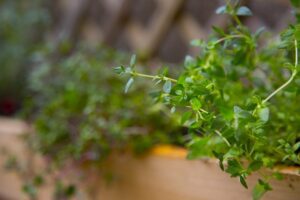
5 loại thảo mộc mạnh mẽ giúp chống nhiễm trùng tự nhiên và hỗ trợ sức khỏe miễn dịch
Tháng 4 17, 2023Trong nhiều thế kỷ, trước khi kháng sinh hiện đại ra đời, thảo dược là công cụ chính được sử dụng để hỗ trợ hệ miễn dịch tự nhiên của cơ thể. Mặc dù kháng sinh kê đơn rất cần thiết để điều trị các bệnh nhiễm trùng nghiêm trọng do vi khuẩn, nhưng việc lạm dụng chúng có thể ảnh hưởng đến hệ vi sinh vật đường ruột, nơi có 70-80% của hệ miễn dịch. Các bài thuốc thảo dược là một cách hỗ trợ cơ thể một cách tự nhiên, đặc biệt là trong thời gian bị bệnh theo mùa và cảm lạnh. Không giống như kháng sinh chỉ nhắm vào vi khuẩn, nhiều loại thảo dược mang lại lợi ích phổ rộng, giúp bạn phục hồi và tăng cường sức đề kháng. Dưới đây là năm loại thảo dược hiệu quả nhất để hỗ trợ sức khỏe của bạn.
1. Cây cúc tím
Tốt nhất cho: hỗ trợ miễn dịch quanh năm hoặc khi có dấu hiệu đầu tiên của bệnh tật và ớn lạnh để hỗ trợ bạn về các triệu chứng và thời gian.

Lần đầu tiên được người Mỹ bản địa sử dụng để điều trị rắn cắn, đau bụng, vết thương và nhiễm trùng, cây cúc dại đã được sử dụng cho nhiều loại nhiễm trùng trong hàng trăm năm. Được đưa vào thực hành y tế tiêu chuẩn tại Hoa Kỳ vào những năm 1800, cây cúc dại là một loại thuốc chống nhiễm trùng phổ biến. Cho đến khi thuốc kháng sinh phát triển, việc sử dụng nó không còn được ưa chuộng nữa.
Tuy nhiên, cây cúc tím (Echinacea) đang dần trở nên phổ biến trở lại khi các nghiên cứu xác nhận rằng nó có hiệu quả trong việc hỗ trợ cơ thể trong các cơn đau và cảm lạnh theo mùa. Hoạt động chủ yếu như một chất hỗ trợ miễn dịch quanh năm, nghiên cứu cho thấy nó đặc biệt hiệu quả trong việc chống lại các bệnh nhiễm trùng đường hô hấp trên và vi khuẩn gây bệnh.
Echinacea có tác dụng tốt nhất khi có dấu hiệu nhiễm trùng đầu tiên, giúp giảm các triệu chứng và thời gian nhiễm trùng. Nếu bạn dễ bị nhiễm trùng theo mùa, echinacea có thể được sử dụng như một biện pháp hỗ trợ phòng ngừa. Vì echinacea hỗ trợ hệ thống miễn dịch, điều quan trọng cần lưu ý là những bệnh nhân đang được điều trị các tình trạng tự miễn dịch nên tránh dùng trừ khi được chuyên gia y tế cho biết khác.
2. Mật ong Manuka
Tốt nhất cho: Hỗ trợ điều trị đau họng và kích ứng cổ họng, sử dụng tại chỗ cho vùng da bị kích ứng.
Ở New Zealand, chúng ta đều đã nghe về những lợi ích của Mật ong Manuka, nhưng bạn có biết điều gì làm cho mật ong trở nên đặc biệt không? Đó là Manuka bản địa. Ong thụ phấn cho bụi cây manuka và sản phẩm có đặc tính kháng khuẩn. Theo truyền thống, manuka được sử dụng để hạ sốt, làm thuốc an thần, giảm đau và hỗ trợ các tình trạng tiết niệu. Có bản chất kháng khuẩn và hỗ trợ miễn dịch, manuka là một phương pháp hỗ trợ hiệu quả cho các bệnh nhiễm trùng theo mùa. Đặc tính làm se của Manuka có nghĩa là nó cũng là một chế phẩm bôi ngoài da tuyệt vời.
3. Cây xạ hương
Tốt nhất cho: Làm dịu cơn ho và đau họng, và hỗ trợ các bệnh về đường hô hấp.

Được sử dụng như một loại thảo mộc nấu ăn thơm trong nhiều thế kỷ, việc sử dụng cỏ xạ hương như một chất kháng khuẩn có từ thế kỷ 17 khi các nhà thảo dược sử dụng cỏ xạ hương để điều trị các vấn đề về hô hấp. Các nhà thảo dược học phương Tây truyền thống vẫn sử dụng cỏ xạ hương cho đến ngày nay để điều trị các tình trạng về đường hô hấp. Do đặc tính kháng khuẩn và chống oxy hóa, phần lớn là do tinh dầu, cỏ xạ hương đã được Ủy ban E của Đức phân loại là một loại "thuốc sát trùng" tự nhiên. Cỏ xạ hương là một phương pháp hỗ trợ hiệu quả cho cả ho khan và ho có đờm. Với tác dụng hỗ trợ thư giãn của các ống phế quản, cỏ xạ hương giúp điều trị các tình trạng co thắt; trong đó tác dụng long đờm giúp làm loãng và tống đờm ra ngoài. Cỏ xạ hương cũng có thể được súc miệng để hỗ trợ cổ họng. Được sử dụng tại chỗ khi pha loãng, nó cũng có thể được sử dụng cho các bệnh nhiễm trùng da hoặc vết thương nhỏ. Tuyệt vời khi được sử dụng như một chất hít qua hơi nước trong nước nóng, tinh dầu rất mạnh, 1-2 giọt có thể là đủ.
4. Lá ô liu
Tốt nhất cho: Hỗ trợ miễn dịch phổ rộng và hỗ trợ miễn dịch nói chung.
Ô liu từ lâu đã được đánh giá cao vì quả và dầu của nó; tuy nhiên, lá ô liu mới là thứ được sử dụng để chữa bệnh theo truyền thống. Được cho là có khả năng chống lại côn trùng và thiệt hại, lá ô liu có hoạt tính kháng khuẩn phổ rộng. Lá ô liu có khả năng bảo vệ rộng rãi, hỗ trợ phản ứng miễn dịch tự nhiên của chúng ta. Nó cũng có hiệu quả trong việc hỗ trợ cơ thể vượt qua các bệnh nhiễm trùng đường hô hấp, như một chất giãn phế quản tự nhiên và như một loại thuốc bổ miễn dịch nói chung.
5. Hoàng kỳ
Tốt nhất cho: Tăng cường khả năng miễn dịch lâu dài, giảm mệt mỏi và phục hồi sau khi ốm.
Lần đầu tiên được ghi chép trong Materia Medica cách đây khoảng 2000 năm, hoàng kỳ được sử dụng như một chất chống oxy hóa để hỗ trợ chức năng miễn dịch. Nghiên cứu hiện đại đã xác nhận điều mà chúng ta luôn biết, hoàng kỳ hỗ trợ hệ thống miễn dịch và như một chất chống oxy hóa, bảo vệ các tế bào khỏi bị tổn thương. Hoàng kỳ đã được chứng minh là có thể rút ngắn thời gian mắc bệnh theo mùa và cảm lạnh. Phổ biến trong các phương thức truyền thống của Trung Quốc, hoàng kỳ được sử dụng để tiếp thêm sinh lực, tăng cường và bổ khí. Hoàng kỳ cũng có chức năng như một chất thích nghi, giúp hỗ trợ cơ thể vượt qua các tác nhân gây căng thẳng về thể chất, tinh thần và cảm xúc, đó có thể là lý do tại sao nó thường được sử dụng để tăng cường phục hồi và giảm mệt mỏi. Hoàng kỳ thường được sử dụng cho các tình trạng miễn dịch kéo dài và tình trạng sức khỏe kém kéo dài. Theo truyền thống, hoàng kỳ thường không được sử dụng trong các bệnh nhiễm trùng cấp tính nhưng hãy tham khảo ý kiến của bác sĩ chăm sóc sức khỏe tự nhiên của bạn nếu bạn không chắc chắn. Cơ thể có khả năng tự chữa lành bẩm sinh khi được nuôi dưỡng đúng cách.
Khi sức khỏe và chữa bệnh tự nhiên ngày càng phổ biến và chúng ta biết về tác hại mà việc sử dụng kháng sinh lâu dài có thể gây ra, nhiều người đang chuyển sang dùng thảo dược để hỗ trợ sức khỏe và tinh thần của họ. Một số loại thảo dược có chứa các chất mạnh không chỉ hỗ trợ hệ thống miễn dịch mà còn hỗ trợ các hệ thống khác của cơ thể cùng một lúc. Thảo dược có thể hoạt động tốt cùng với y học chính thống, tuy nhiên, điều quan trọng là phải biết rằng có thể xảy ra tương tác, vì vậy hãy luôn trao đổi với chuyên gia chăm sóc sức khỏe tự nhiên của bạn trước khi sử dụng. Với mùa đông đang đến gần, đây là lúc bạn cần ưu tiên sức khỏe và tinh thần của mình. Duy trì cơ thể bằng các loại thảo dược kháng khuẩn tự nhiên có thể giúp hỗ trợ hệ thống miễn dịch của bạn chống lại các bệnh nhiễm trùng theo mùa.
Câu hỏi thường gặp

Hỗ trợ mục tiêu cân nặng khỏe mạnh
Tháng Mười Một 21, 2023Bước vào mùa hè luôn là thời điểm tuyệt vời để tập trung lại các mục tiêu sức khỏe của chúng ta. Cam kết
Đọc thêm ➾

Bạn có phải là người ăn uống theo cảm xúc không? Làm thế nào để hỗ trợ việc ăn uống lành mạnh
Tháng Mười Một 14, 2023Cho dù đó là vì bạn cảm thấy căng thẳng, mệt mỏi, cô đơn, buồn chán hay thậm chí là hạnh phúc; cảm xúc
Đọc thêm ➾

Hỗ trợ cho căng thẳng đầu
Tháng Mười Một 8, 2023Căng thẳng đầu – không ai muốn cả; hầu như ai cũng gặp phải! Không phải tất cả mọi người đều bị căng thẳng đầu.
Đọc thêm ➾

Bạn cần thư giãn? Magiê tác dụng nhanh có thể giúp ích.
Tháng 10 16, 2023Căng thẳng hay mất ngủ? Bạn không phải là người duy nhất. Thực tế, nhiều người thường xuyên gặp phải tình trạng này.
Đọc thêm ➾
